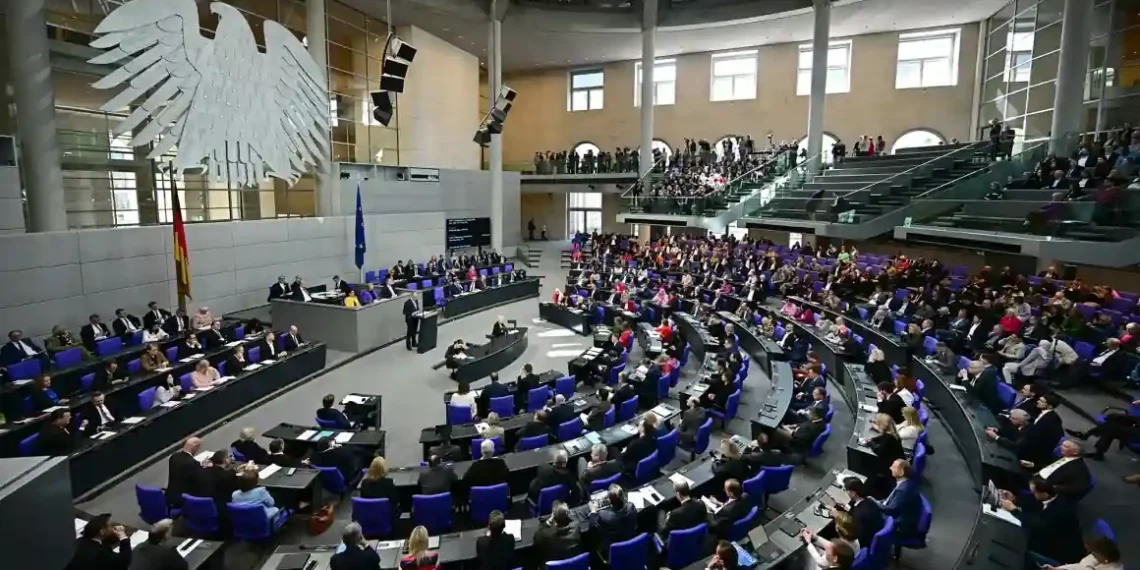Germany Approves Massive Military Spending and Debt Reform Under Merz
Germany’s incoming chancellor, Friedrich Merz, has secured parliamentary approval for a historic expansion of state borrowing, paving the way for a significant increase in military spending. The vote, which took place on Tuesday, marks a major shift in Germany’s fiscal and defense policies.
A Landmark Vote and Political Implications
Merz won the vote with a 513 to 207 majority, successfully amending Germany’s constitutional “debt brake,” a long-standing mechanism that limits government borrowing. The policy shift comes after intense negotiations with the Greens, who demanded concessions on how the new funds would be allocated. With this change, defense and security-related expenditures exceeding 1% of GDP will be exempt from the debt restrictions.
This move is seen as an effort to revitalize Germany’s struggling economy, modernize infrastructure, and significantly bolster military capabilities. The approved legislation will enable Germany to create a €500 billion ($545 billion) infrastructure fund, with additional projections estimating defense spending could reach €600 billion over the next decade.
A Defense ‘Turning Point’
Germany’s commitment to ramping up military spending represents a fundamental change in its post-WWII defense policy. Historically cautious about military expansion, the country is now responding to growing security concerns in Europe, particularly in light of the United States’ shifting stance on NATO under former President Donald Trump.
Merz’s plan builds upon the 2022 security strategy known as Zeitenwende (“turning point”), originally introduced by outgoing Chancellor Olaf Scholz following Russia’s full-scale invasion of Ukraine. However, Scholz’s coalition struggled to fully implement the policy, creating an opportunity for Merz to push for more aggressive action in strengthening Germany’s defense capabilities.
Economic and Geopolitical Impact
Financial experts have described this policy shift as Germany’s most significant fiscal reform since reunification. Robin Winkler, a senior economist at Deutsche Bank, called the decision a “historic fiscal regime shift,” while Carsten Brzeski of ING noted that Germany’s move away from strict fiscal austerity could have widespread implications for the European Union’s economic policies.
Critics argue that loosening the debt brake could strain public finances, while supporters believe increased investment is necessary to ensure economic resilience and national security. Additionally, Merz has signaled a desire for greater European defense autonomy, aiming to reduce reliance on the United States for security.
Next Steps and Uncertain Future
The debt brake reform now moves to the upper house of Germany’s parliament, where it is expected to pass with the required two-thirds majority. Whether this large-scale borrowing will translate into sustainable economic growth and a stronger military remains to be seen.
As Germany embarks on this new trajectory, the coming years will determine whether this financial gamble will fortify its position as a leading power in Europe or create long-term fiscal challenges.
This article was rewritten by JournosNews.com based on verified reporting from trusted sources. The content has been independently reviewed, fact-checked, and edited for accuracy, neutrality, tone, and global readability in accordance with Google News and AdSense standards.
All opinions, quotes, or statements from contributors, experts, or sourced organizations do not necessarily reflect the views of JournosNews.com. JournosNews.com maintains full editorial independence from any external funders, sponsors, or organizations.
Stay informed with JournosNews.com — your trusted source for verified global reporting and in-depth analysis. Follow us on Google News, BlueSky, and X for real-time updates.














